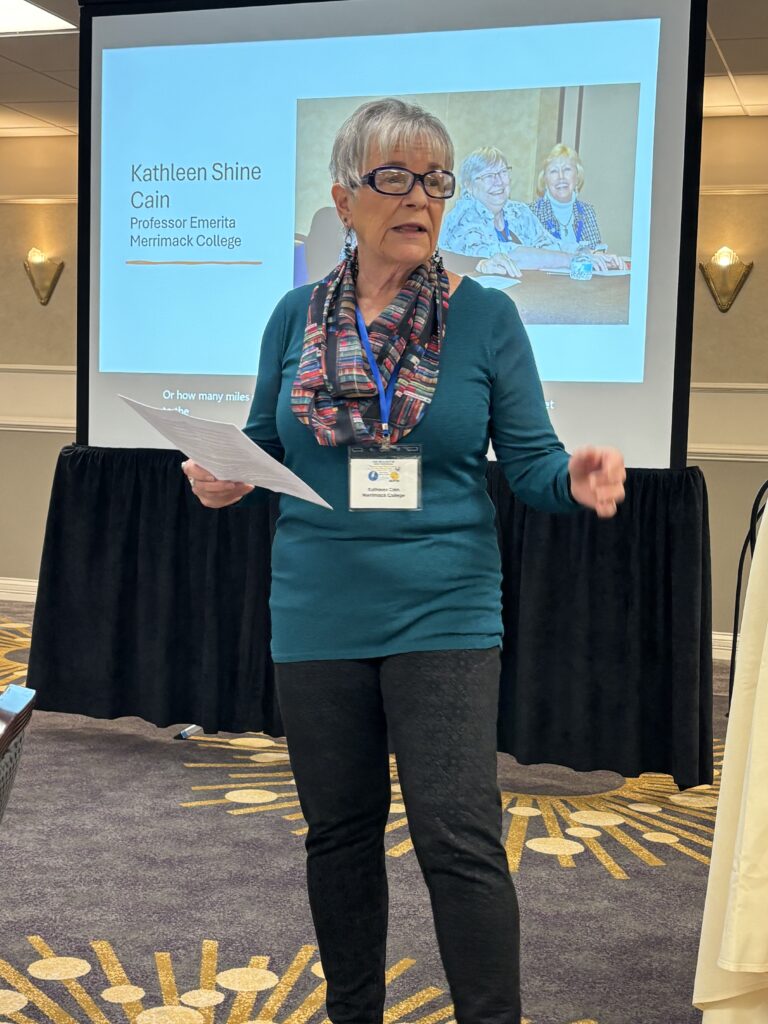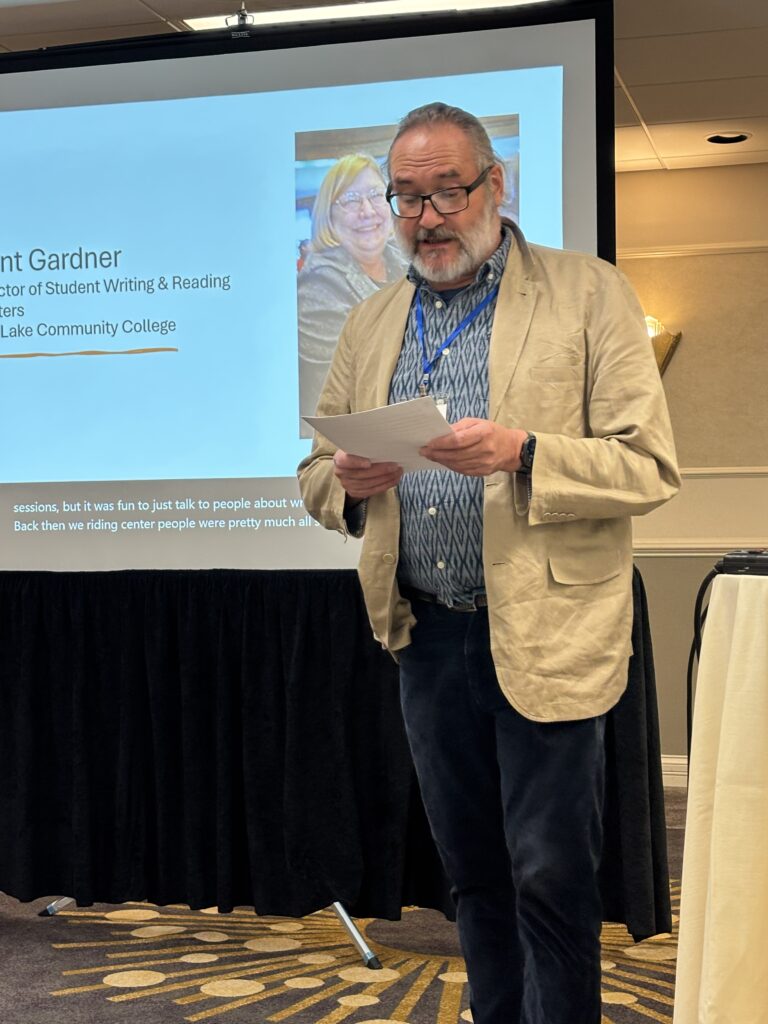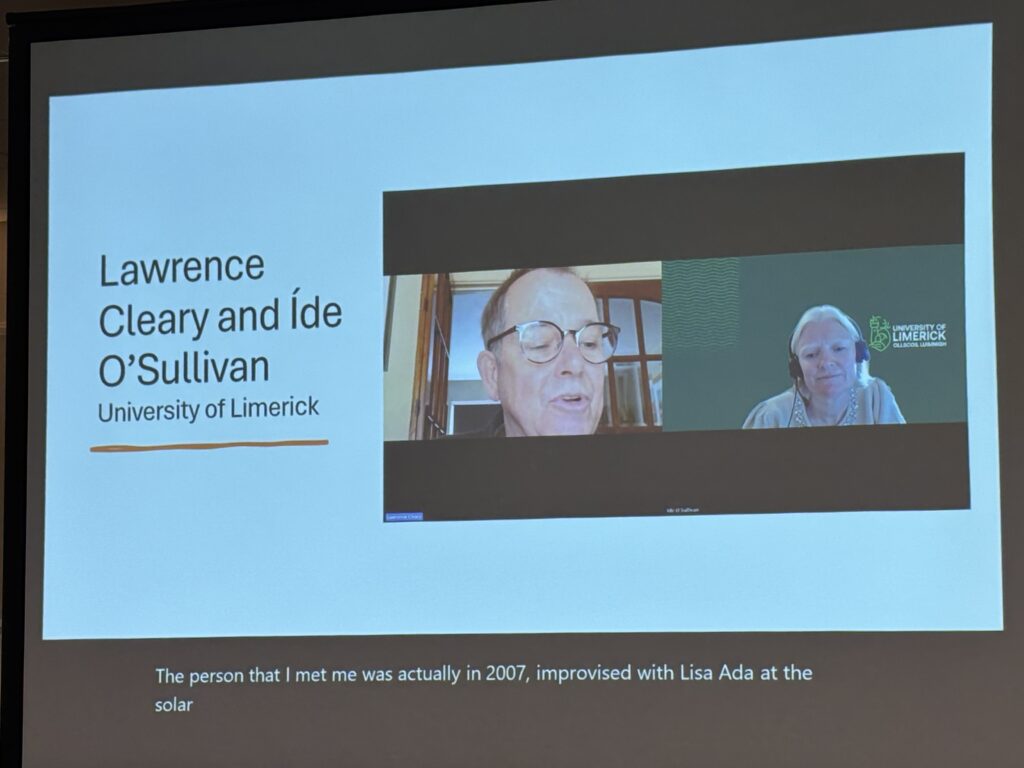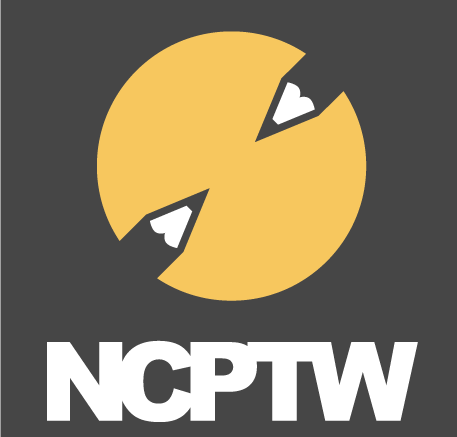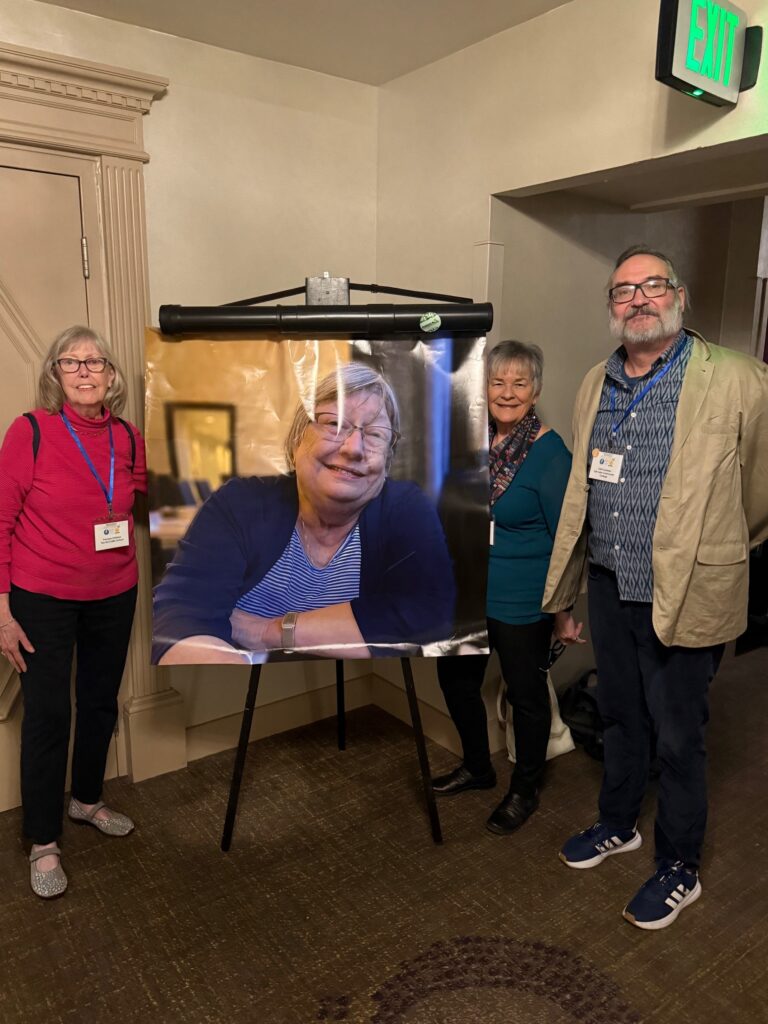
On October 16, 2025 fiends and colleagues of Leigh Ryan gathered at the joint National Conference on Peer Tutoring in Writing and International Writing Centers Association Conference in Cincinnati, Ohio to celebrate the life and work of Leigh Ryan. Below are posted tributes from Pam Childers, Kathleen Shine Cain, Al Decicio, William J. Macauley, Byron Stay, Trixie Long Smith, Lawrence Cleary, Íde O’Sullivan, Clint Gardner, and Chris Ervin. NCPTW welcomes comments about Leigh Ryan’s impact and legacy.
Pam Childers
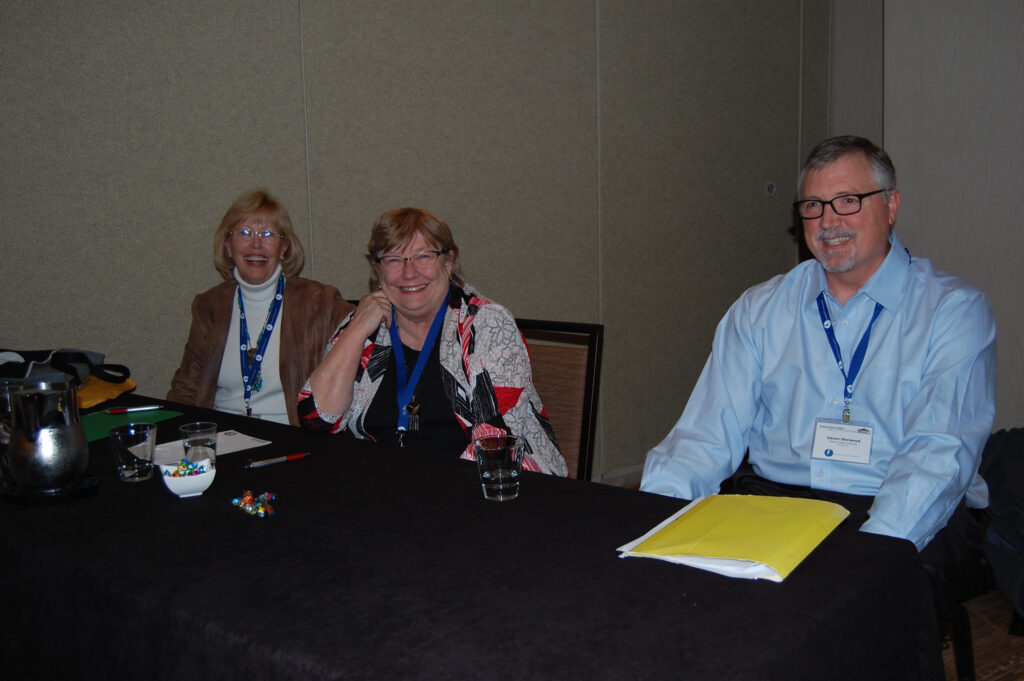
At the 2nd annual Peer Tutoring Conference at Bucknell University in 1985, Leigh and I bumped into each other with peer tutors by our sides. We soon discovered we were born in the same year, had connections to Maryland and the Northeast, and shared a passion for writing center work and our peer tutors. By 1990, Leigh was an officer in MAWCA, while I was an officer of the NWCA, the forerunner to IWCA. We worked together on building regional to international connections, conferences, workshops, sessions, publications, and eventually sharing rooms at conferences throughout the world at her last IWCA conference in 2018.
What you may not know is that this brilliant scholar, caring director, mother and friend, spent decades as a feisty lady who stood up for every good cause against some of the worst odds–budget cuts, insufficient help to train tutors resulting in her writing them a guide, a long list of social injustices, loss of a spouse, serious health issues that began to limit her physical abilities, isolation during a pandemic, and frustration at not being able to do more for others.
On a personal note, Leigh hosted my parents at a MAWCA conference in the 90s when I was doing the keynote and two decades later drove to Pennsylvania to read the Bible passage at their Celebration of Life Service. One year at a terrible heatwave on the mosquito laden banks of the Oder River in Germany, Leigh struggled to walk to a dinner with the help of my husband Malcolm. However, always feisty Leigh made it to the restaurant with a smile on her face and cheers all around from out international friends. Before the Denver IWCA in 2016, Leigh flew all day to western Colorado to spend several days at our home and visit some hidden gems by car before we took the all-day train ride along the Colorado and across the Rockies for the conference. I can still see her laughing and taking photos in the observation car where she spent almost the entire day. When we got off the train, we had to take a cab three blocks to the conferences hot, but that only slowed her physically until she saw old and new friends once we got there.
An avid reader/researcher with floor-to-ceiling books, Leigh also left bags full of greeting cards to send to anyone who needed a helping hand or word of encouragement. She was ready with an email, phone call or card for former students, a director she may have never met, professional and person acquaintances and friends, or strangers someone had told about her.
Finally, you will hear today of Leigh’s sense of humor, love of sharing time with others, many kindnesses and well-deserved accolades. To the very end she asked questions, challenged ideas, and as any collaborator with Leigh remembers, stuck to her guns when she really believed in something.
Today, I still listen for a late-night phone call or an unexpected email telling me she had found something we should consider working on or her willingness to step in and do a first draft of our next proposal or project. Right up to her last days she was still volunteering to do more projects for her profession or for others she cared about. Leigh, you will live on for so many of us. Thank you for being you!
Kathleen Shine Cain
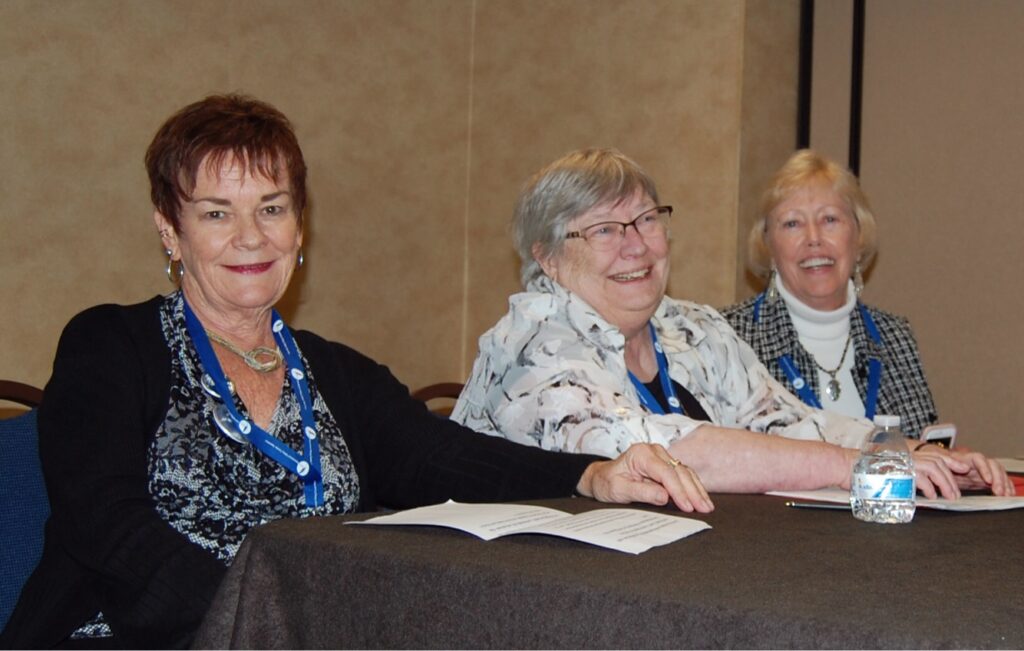
What can I say about Leigh Ryan that many of you don’t already know?
She won the Ron Maxwell Award from NCPTW. But do you know how many times she did her own fundraising to supplement the university’s coverage? Or how many miles she drove that van full of student tutors to those conferences? She volunteered for local organizations. But do you know that she was largely responsible for resurrecting the reputation of Henry Vinton Plummer, the first black chaplain in the us army, who was dishonorably discharged during the civil war? She wrote The Bedford Guide for Writing Tutors and carried it through six editions. But do you know that she insisted that the guide be made available free to tutors? But what I really want you to know about Leigh is what a kind, supportive, loving friend she was—especially to me and Pam. As many of you know, we began what we thought would be maybe a year-long project surveying former writing center directors in 2018. Needless to say, it grew. And through the next seven years we met at conferences, and held zoom meetings almost every week. The writing collaboration was incredible, but even more significant for us was the friendship that grew. Every birthday and Christmas Pam and I would look forward to the most thoughtful and often quirky gifts. When IWCA was in Baltimore I was able to stay with Leigh for a couple of days prior. Despite her mobility issues, she took me on a tour of the university campus, arranged for a private tour of Riversdale, the plantation she volunteered for, took me out to lunch. Pam and I were looking forward to spending time with her before the C’s conference in Baltimore last April as well—it would have been the first time we three were together in person in about four years. And then we got the email from her daughter, Colleen. Ironically, we were working on the final edits of our chapter in the collection Writing Emergencies when we heard. Pam and I added a postscript to that chapter, which begins “And now we are two, not three.” And now, months later, I still feel the same way I told Pam that March morning: I feel like I’ve lost a limb.
It may be a cliche, but I think both Pam and I feel that you were with us at that conference, and are with us today, Leigh. So here’s to you, a remarkable scholar, colleague, and friend.
Al DeCiccio
I want to say a few words about Leigh Ryan before I begin to talk about collaboration.
Leigh was generous to colleagues and tutors especially. It’s why she’s one of four people to win both the Maxwell Award for her NCPTW work and the Muriel Harris Outstanding Service Award (MHOSA) for her writing center work. She was one of the champions of the international writing center community, making numerous presentations abroad and helpful connections outside the USA. In an introductory speech I gave before Leigh was awarded the MHOSA in 2010, I said winners of this award were described as “leaders.” These leaders
- listen
- are empathetic
- heal
- are aware
- persuade
- conceptualize
- are stewards
- are committed to the growth of others and
- are community builders.
Of course, the MHOSA committee was impressed with Leigh’s leadership within the writing center community, always celebrating the work of her colleagues and their peer tutors. The committee also noted Leigh’s capacity to work closely and presently with students and teachers in the field of literacy-community building, locally, regionally, and internationally.
And they were also struck by her humble way of making a name for herself. We remember Leigh saying, “I don’t think I’m anything special in the writing center world; I just have lots of experience. When I look at my record, I’ve done a lot, but I’ve always just done it quietly. It mattered to me.”
Leigh was dedicated to our community of writing centers and peer tutors, and she joined Kathy and Pam several times to visit my Practicum tutors during the pandemic and afterwards, offering sage advice to help them in their pending tutoring, convincing them they could do the job of tutoring writing, that they were keystone species within the university. It was good for those tutors to hear that from Leigh. Leigh was working with Pam Childers and Kathy Cain and with the MHOSA committee to the end. Leigh was a hard worker, dedicated to completing her tasks.
I will miss Leigh Ryan; she always supported my work. She was one of a kind!
William J. Macauley
I have been racking my brain trying to find a story about Leigh and me. No luck so far. I think it might be because she was always such a presence for me that she was there even when she wasn’t. And she was never singling me out–she was always a contributing, felt, and supportive presence in our shared social and professional get-togethers. Her scholarship was always there. Her insights and questions. Her support and generosity. I think it might be fair to say that she never, at least with me, felt a need to lay claim to anything or call attention to her roles in the so many things she did. She just seemed always content to be in the mix and able to help. It seems odd that I so much miss her when she was so careful to never call attention to her magnanimity nor contributions to my professional and personal life.
Byron Stay
Leigh Ryan and I met at the third IWCA Conference in Park City, UT in 1997. I remember sitting with her at a noisy bar with a group of other IWCA people. From that moment on we became fast friends, not just because she was a brilliant mind, but also because I learned we were neighbors. A few years later we collaborated on the planning for the IWCA Conference in Baltimore.
That year, at the annual banquet, I sat with Leigh at a table with a number of other colleagues. I knew that Leigh would be receiving the Muriel Harris Outstanding Service Award and was anxious to hear the prize awarded. Just as Jeannie Simpson began announcing the award, someone at our table turned to Leigh and asked for information on how the award was granted. I kept thinking “No! No! Not now!” Leigh didn’t even get to hear her own award being announced!
She was a wonderful friend and colleague.
Trixie Long Smith
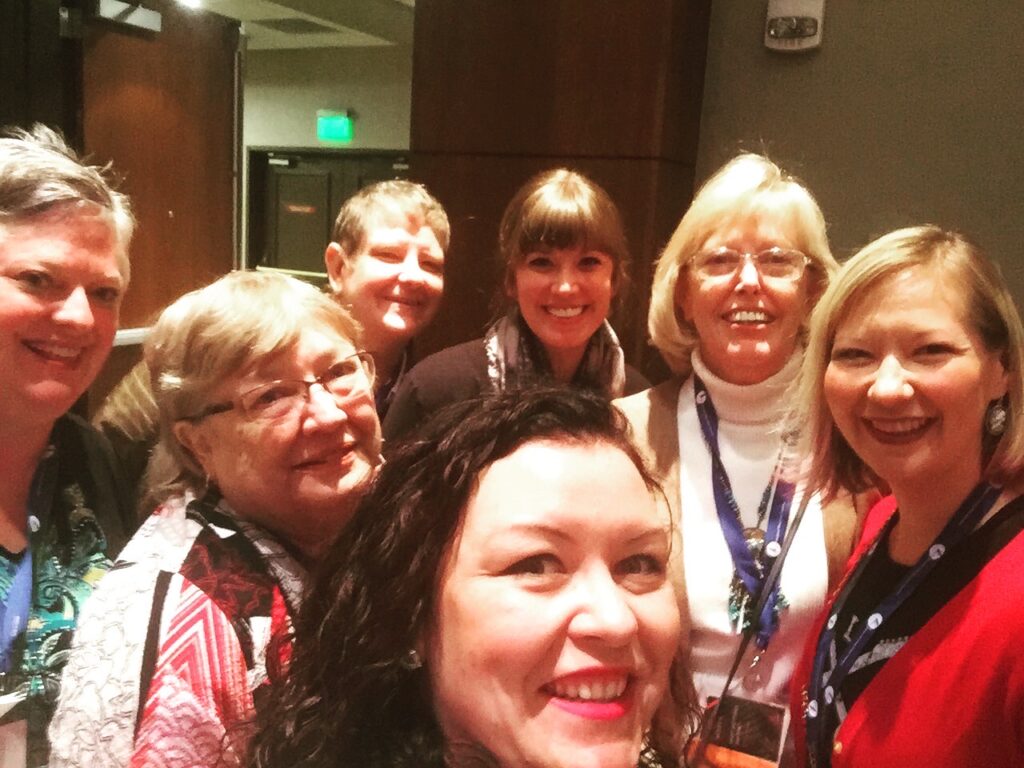
My first academic conference while in graduate school was MAWCA and Leigh was the conference host. She was kind and welcoming to me and my two colleagues, also their first conference. We had done related projects in the writing through a course in linguist anthropology focused on language and power. Leigh encouraged us to pull this work together in one paper and get it published, which we eventually did. From that point forward I began running into Leigh at conferences and a friendship developed out of the mentoring.
Many years later after becoming friends and colleagues with Pam, it made sense to me that Pam and Leigh were friends and could be mutual mentors for me. When they asked me to be a part of a workshop focused on mentoring, I jumped at the chance. We were facilitating this workshop at the European WCA conference in Fraiberg, Germany and then again at a Writing Conference in Glasgow. As we prepared for this big trip, Leigh and I decided to share a room in Fraiberg and ease both of our budgets. We quickly became conference buddies starting with our first dinner next to the hotel, drinking free shots designed to look like the German Flag every time Germany scored a goal in the World Cup playoffs. We quite the adventures travelling from Germany to Scotland to Ireland and then home. There was lots of good conversation—about writing centers, but also about history, and women’s studies, anti-racism, and mentorship. There was good food and lots of wine, Leigh loved her wine. There was also a Sex and the City marathon in there somewhere.
In our mentoring workshop, we talked about webs or networks of mentoring and Leigh was definitely a part of my web. I admired her ability to balance her writing center work with her other interests and how she explained the need for having these outside interests and community engagements to bolster her spirits and the never-ending tasks of running a large, active writing center. Even after retiring, Leigh continued to pursue her varying interests and balance the different kinds of research she pursued. I’m sad to no longer be able to drop her an email to ask a question or share a thought. She is and will continue to be missed. But I’ll never see a box of wine without thinking of her at conferences. So cheers to Leigh.
Lawrence Cleary and Íde O’Sullivan
Clint Gardner
I first met Leigh Ryan when I attended the 1997 National Writing Centers Conference in Park City, Utah. It was the first time I had attended any kind of writing center conference aside from a single hour of Rocky Mountain Writing Centers Association held at Rocky Mountain MLA organized by the late Penny Bird. I recall that Leigh was warm and welcoming, and I recall sitting with her in the “Computer Assisted Writing Center” that Larry Giddings and I put together, which basically was a conference writing center and talking about writing center work. Back then, we writing center people were pretty much all self-taught, since there weren’t any academic programs that focused on our work. We made use of resources like Gary Olson’s Writing Centers: Theory and Administration (1984), or Mickey Harris’ Teaching One-to-One: The Writing Conference (1986) and interacted online with each other over WCENTER. As writing center professionals, we talked about issues ranging from non-directive tutoring models, how to hire and train tutors, as well as such mundane things as where to find furniture. While I don’t recall what Leigh and I talked about, I’m sure it was an engaging and enthusiastic discussion befitting Leigh’s personality. My experience meeting Leigh for the first time is reflected in the press release for the 2009 NCPTW Maxwell Award “Whether in a global setting or local, Ryan’s leadership is generous and personal. One writing center director remembers ‘the ease with which my tutors and I have always fallen into conversations with Leigh. One year at Merrimack or Muhlenberg (I forget), I introduced one of my undergrad tutors to Leigh, and the two of them were still talking an hour later’” (“Leigh Ryan Receives the 2009 NCPTW Maxwell Award,” 2009).
At the time, I had no idea that Leigh was the author of the first published guides for tutors: The Bedford Guide for Writing Tutors (1994). In her “Preface for Writing Center Directors” for the second edition (1998), Leigh writes “In my years directing a writing center, I have longed for a single, short book that my tutors and I could learn from and that could serve as a resource for tutoring information and techniques” (iii). Others in the field, of course, agreed, and that book now co-authored with Lisa Zimmerli (sixth edition, 2016), is still available from Macmillan Learning. I have no hard statistics on tutor training materials used, anecdotally, I do hear people mention that they still use it frequently. Leigh was also insistent that the book would always be free and that it was always available to writing centers.
At that conference in Park City, Leigh was on a panel with Berger, Giddings, Hyman, Profizich, and Steinberg[1] titled “The Politics of Change: Consideration and Approaches” (Bird, 1997, p 39). I think that panel is a good indicator of Leigh’s commitment to the field, and her concerns about “change” that writing centers writ large always seem to be facing. As the abstract for the session states “Within our institutions, effecting changes—particularly significant ones—in the writing center can be frustrating and time-consuming. Often changes involve money, no simple matter at a time when many different campus groups are competing for limited funds” (Bird, 1997, p. 39). Oh, how times have not changed! Typical of Leigh, however, the session takes a “can do” approach seeking to “convince our audience—administrators, faculty, our colleagues—not only that our suggested changes will be beneficial, but, more importantly, that they are worthwhile and significant enough to warrant their attention…and their action (Bird, 1997, pp 39-40).
Leigh’s service to the wider writing center community is emphasized by her work as secretary of N(I)WCA, and I recall fondly attending my very first N(I)WCA in-person board meeting as a member at the Indiana conference in 1997. Leigh wasn’t afraid to discuss issues, even while taking notes. She also spurred me on to taking on the role of IWCA’s first web editor, and later to run for Community College Representative for IWCA and then for Vice President/President. Leigh was always there are as a source of support in my professional endeavors.
Leigh was deeply committed to peer tutoring and truly earned the Ron Maxwell Award for distinguished leadership in promoting the collaborative learning practices of peer tutoring in writing in 2009. As was stated in the press release “Dr. Ryan has been a leader in the conference organization from the beginning. She co-hosted the third conference that was held at Georgetown in 1986. The Georgetown director is remembered to have thanked her at the conference banquet, saying something like “if you need to organize your life, contact Leigh Ryan.”
References
Bird, Penny, Ed. (1997) NWCA 1997 Park City, UT: Conference Proceedings. Personal Archive. Available from https://drive.google.com/file/d/0Bwr_YA5PVDNHaW10QzFMYzFtSnM/view?usp=sharing&resourcekey=0-9LruhRzh9ikRhrLFCdVsng .
Harris, Muriel. (1986). Teaching One-to-One: The Writing Conference. Urbana, Ill: NCTE.
“Leigh Ryan Receives the 2009 NCPTW Maxwell Award.” The Dangling Modifier. Available from https://sites.psu.edu/thedanglingmodifier/wp-content/uploads/sites/1569/2013/04/Leigh-Ryan-Receives-the-2009-NCPTW-Maxwell-Award.pdf .
Olson, Gary. (1984) Writing Centers: Theory and Administration. Urbana, Ill: NCTE.
Ryan, Leigh. (1994) The Bedford Guide for Writing Tutors. Boston: Bedford Books.
Ryan, Leigh. (1998) The Bedford Guide for Writing Tutors, Second Edition. Boston: Bedford Books.
Ryan, Leigh and Zimmerelli, Lisa. (2016) The Bedford Guide for Writing Tutors, Sixth Edition. Boston: Bedford/St. Martins.
[1] Only last names of Leigh’s co-panelists are listed in the NWCA 1997 conference program.
Chris Ervin
The Writing Center community lost a dear friend, colleague, and earlier this year. On March 2, Leigh Ryan died, and her family, friends, co-authors and research partners, and the writing center community have been mourning her loss and celebrating her life.
Personally, I met Leigh at the 2007 IWCA Summer Institute in Corvallis, Oregon, where she was serving as an Institute Leader. I was only 3 years into my first professional job as the Director of the Writing Center at University of South Dakota when I traveled to Oregon State University to spend time with Leigh and others who, through their publications, had served as mentors for me. I came away from that experience knowing Leigh personally, and over the years I began to consider her a friend.
Even with that friendship, I was surprised and delighted when Leigh wrote the most beautiful letter nominating me for the NCPTW Ron Maxwell Award. I cherish that letter, not only because it was persuasive to the Maxwell Committee, but because I felt seen. In 2015 I was selected as the Ron Maxwell Leadership Award recipient, so I got to join Leigh and others like her good friend Kathy Cain on that committee.
Even before we served on the Maxwell Committee together, Leigh was always quick to talk with me at a conference and to ask about my family. She knew my children by name and would regularly email and always asked what they were up to, and she would trade stories of her grandchildren’s activities and their visits with her. She knew my son has a rare GI condition that sometimes leads to hospitalizations, which is why I’m not at the conference right now. I know Leigh would already have reached out to ask me how he’s doing, how she might help from afar. That’s who she was.
I’ve found it’s the rare person who goes to the effort to know the people they encounter, and I think Leigh was one of those rare ones, full of love for others, even those she knew mostly from a distance like me.
